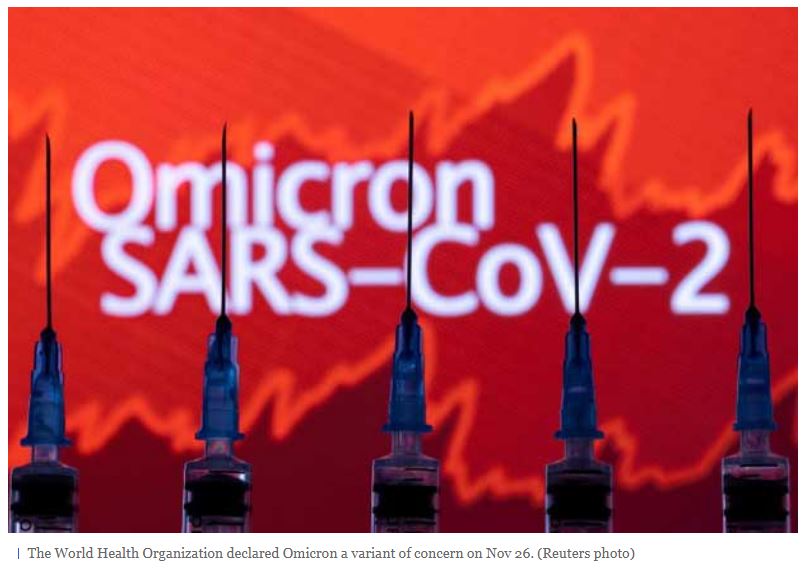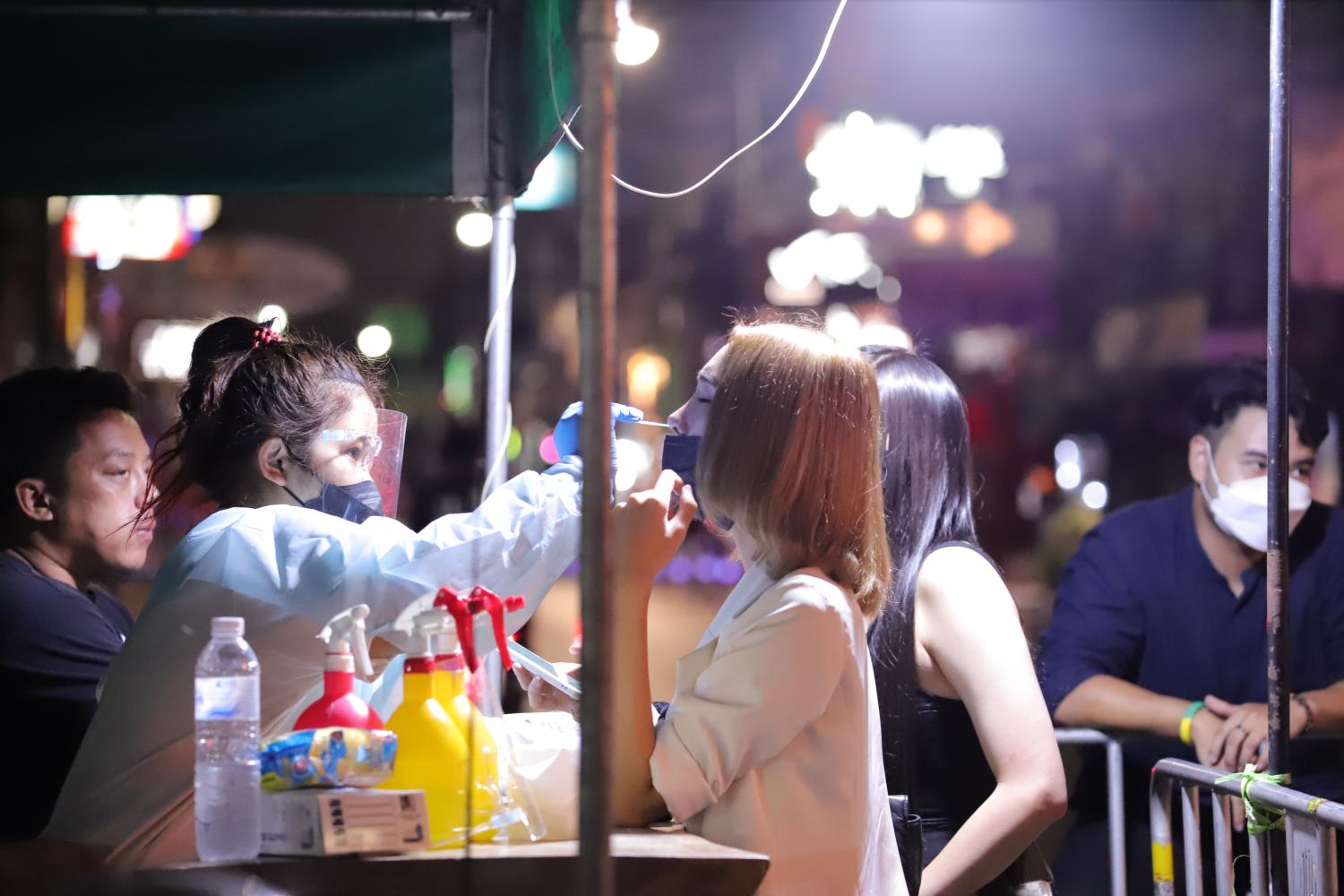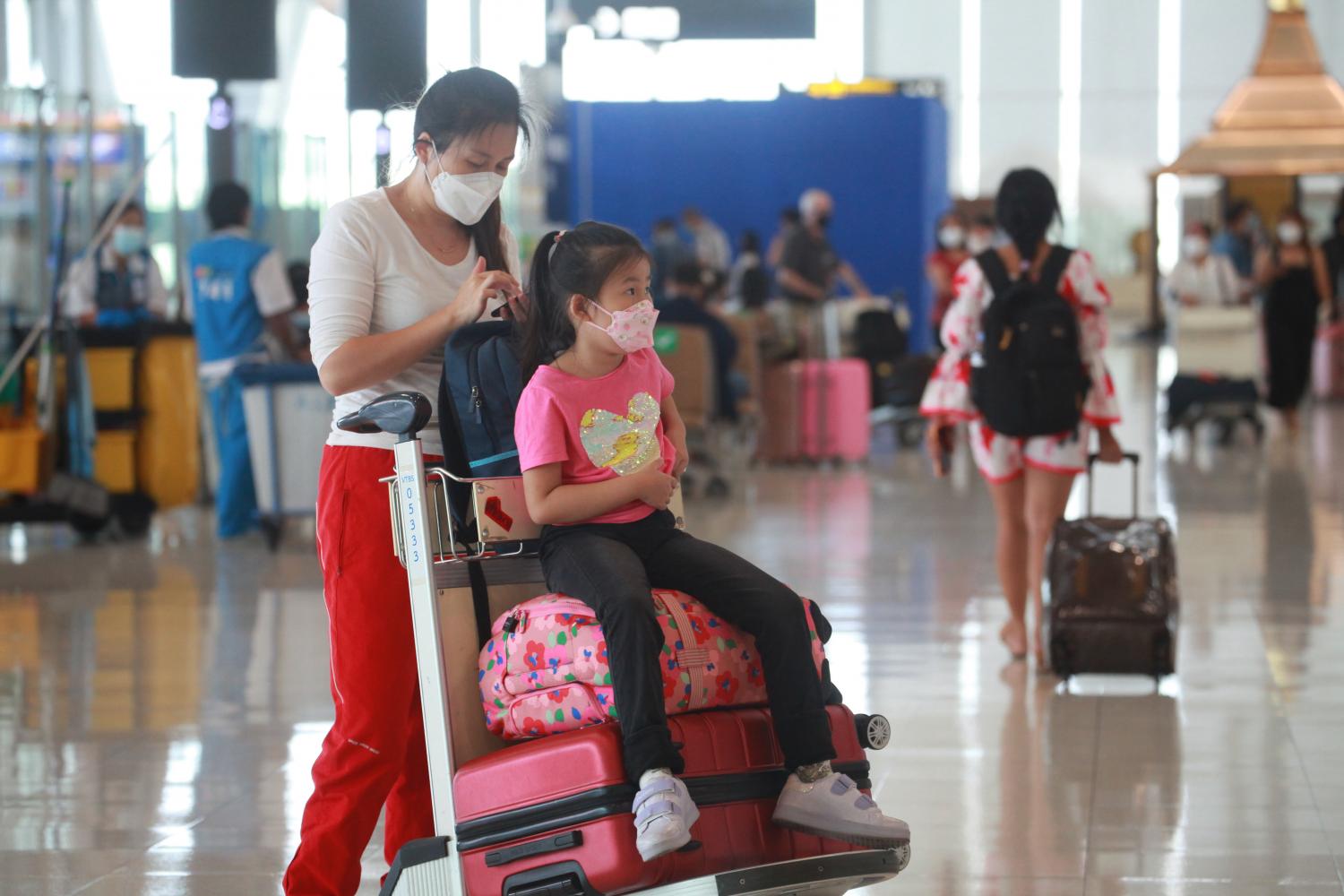Thailand: The Omicron factor
Since the new, highly contagious Omicron strain was designated a variant of concern by the World Health Organization on Nov 26, many countries have made a U-turn on loosening Covid-19 curbs.
Thailand is one of those nations, deciding to shelve the idea of replacing costly RT-PCR tests with more affordable antigen test kits because it was expected to lure inbound travellers.
Public concern over the new variant has fluctuated during the past two weeks. The Stock Exchange of Thailand Index declined by almost 80 points, or 4.8%, in the first three days after news of the variant spread.
Then the bourse settled given the improving sentiment when the government vowed not to reimpose a lockdown and urged the public not to panic.
Thailand eventually registered a small number of confirmed Omicron cases, but lower daily infection totals — less than 5,000 cases per day — have helped to keep public sentiment positive in the first half of December.
However, for those reeling from the Covid crisis, the emergence of a new variant has crushed their hopes of restarting economic activities, while the government’s response to their calls for support remains half-hearted.
A health official performs an ATK test for a visitor who is not vaccinated at Khao San Road, following the detection of the first case of the Omicron variant in the country. Pornprom Satrabhaya
STUCK IN PLACE
While tourism businesses such as hotels are dusting off their operations in preparation for international arrivals, outbound tour operators still have to wait at the starting line as mandatory quarantines at many destinations remain an obstacle to leisure tourism.
Last month, tour operators saw a glimmer of hope as they prepared outbound package tours for early 2022, but the Omicron variant detected in many countries suddenly clouded tourism confidence the last two weeks, said Suthiphong Pheunphiphop, president of the Thai Travel Agents Association.
He said travellers were worried about the situation because there were too few facts about the new variant.
However, after learning that Omicron may not be more dangerous than other variants, especially for those immunised, a good vibe in outbound travel gradually returned, said Mr Suthiphong.
“Public concern may subside, but the emergence of Omicron has affected the reopening policy of many countries, particularly favoured destinations for Thais such as Japan, which reinstated strict border controls. South Korea is battling a spike in caseloads even without the Omicron threat,” he said.
Chotechuang Soorangura, managing director of NS Travel and Tours, said outbound tours will resume with limited choices and few target customers as operators can only offer excursions to Europe and the US, which usually have higher prices, appealing to travellers with high purchasing power.
European countries require minimal travel restrictions for Thai travellers. Many of them, such as Switzerland, are open to vaccinated travellers and were included in the eligible list for the Test & Go scheme that requires no quarantine upon their return.
However, if the main destinations for Thai tourists, especially in Asia, remain closed until the third quarter of 2022, there is not much hope to stimulate mass tourism demand during the high season of outbound tours in April, he said.
Most tour operators are struggling with a liquidity crisis as the outbound sales period has been delayed due to border closures, said Mr Chotechuang.
Travellers wear face masks at Suvarnabhumi airport as Covid-19 remains a concern across Thailand and the world. Somchai Poomlard
LOW-INCOME PRIORITY
Meesak Chunharuckchot, president of the Thai Real Estate Association, suggested the government promote a rental scheme for low-income earners as they are unable to access mortgage loans.
“Rent can help low-income earners reduce the cost of living by three times. They can spend 2,500 baht per month to rent a unit, compared with 7,000 baht for a monthly instalment,” he said. “Rental homes can help raise their quality of life.”
Through tax incentives, the government can promote those with savings, now totalling over 15 trillion baht in the market, to invest in a residential unit and rent it out, said Mr Meesak.
Unit prices could be capped at 2 million baht or lower to target low-income tenants.
The government could also reduce the corporate tax for developers that offer units for rent to low-income people, he said.
Mr Meesak said the special business tax for property transactions should be cut to 0.1% of property value from 3.3% because it can give the market a lift, like in 2008-9 when the incentive was previously applied.
The current property incentives — including a deduction of transfer and mortgage fees from 2% and 1% respectively to 0.01% each for residential units priced no more than 3 million baht — should be extended from the end of this year to next year, he said.
“The deduction should cover units priced up to 5 million baht as purchasing power in this segment remains strong,” said Mr Meesak.
Another option is to offer the incentives to all price ranges, but only apply the deduction for the first 3 million baht, he said.
Issara Boonyoung, chairman of the committee for real estate development at the Thai Chamber of Commerce, said the reduced mortgage fees should also be offered for self-built homes and second-hand homes as these markets can help boost the economy.
“The government should extend the effective period for construction permits nationwide for another two years, effective from 2023, as the pandemic has affected many developers. Some require debt restructuring,” he said.
Customers browse New Year’s gift baskets displayed at Siam Paragon on Thursday, as traffic picks up at malls ahead of the festive season. Apichart Jinakul
KEEP UP THE STIMULUS
Earlier in August, domestic car sales plunged by 38.8% year-on-year to 42,176 units, the lowest in 15 months, due in part to the government’s lockdown measures.
With the emergence of Omicron, the Federation of Thai Industries (FTI) and the Association of Used Cars voiced concerns over the new variant causing worry among major car companies participating in the 12-day Thailand International Motor Expo, which ended yesterday.
“No sector can drop its guard or it will encounter more difficulties and see problems escalate,” said Surapong Paisitpatanapong, vice-chairman and spokesman for the FTI’s automotive club.
He suggested the government carry on with stimulus measures, notably the co-payment subsidy scheme and the “We Travel Together” tourism stimulus scheme, as they are a quick and direct way to inject money into the economy.
“The authorities did a good job, but they need to extend the periods to implement these schemes because the economy still needs support,” said Mr Surapong. “We will wait and see whether new stimulus measures will be launched during the New Year period.”
The club expects it to take around one month to ascertain whether Omicron will be a more virulent strain that could lead to a new outbreak in Thailand.
During the festive season, the private sector is hoping the government will come up with fresh stimulus measures as New Year gifts to the public, especially an extension of the tax rebate “Shop Dee Mee Khuen” programme, said Sanan Angubolkul, chairman of the Thai Chamber of Commerce.
He agreed the government should continue stimulus measures next year as it still has a massive source of funds to finance such measures.
The government has 270 billion baht left from the 500 billion baht it borrowed using the second emergency loan decree to mitigate the pandemic’s impact on the economy. It also has 12 billion baht left from the 1 trillion baht borrowed under the first emergency loan decree, plus a mid-year budget for fiscal 2022 worth 89 billion baht.
More importantly, the government still has room to borrow to rehabilitate the economy after it raised the ceiling of the public debt-to-GDP ratio from 60% to 70%, said Mr Sanan.
NO NEED TO SHUT DOWN
He said if the spread of Omicron can be controlled, economic activities are expected to continue on a recovery path.
“Although the private sector is concerned about an outbreak of the new strain, there is still confidence that Thailand’s public health system can manage effectively and contain its spread,” said Mr Sanan. “The private sector insists the country not be shut down, as another lockdown will cause massive damage to the country and overall economy.”
He said with a continued mass vaccination scheme, an Omicron outbreak should produce less damage than occurred with the Delta variant.
“We have to convince the 10 million people who are reluctant to get vaccinated to get jabbed,” said Mr Sanan.
Chadatip Chutrakul, chief executive of Siam Piwat, the mall operator, said the company is unfazed by the new variant. Customer traffic at its four retail complexes — Siam Center, Siam Discovery, Siam Paragon and Iconsiam — has recovered since the country’s reopening on Nov 1.
“Retail business sentiment is much better than last year. I don’t have any concerns because the private sector in Thailand is very strong. We’ve confronted many crises and overcome them all,” she said.
“Even if there are new outbreaks, this will not be new. With the lessons learned the past two years, we are confident we can manage our business.”
Ms Chadatip said although the fragile tourism sector won’t recover until next year, retail prospects remain promising as long as local consumers keep up the positive momentum shown at the end of this year. It is important for retailers to adapt to changes, she said.
Pinyo Tanawatcharaporn, president of the Association of Used Cars, said people should not panic as Thailand has experience dealing with Covid-19 for nearly two years.
“State public health facilities should be well prepared. We don’t want to see a repeat of hospital bed shortages,” he said.
“If adequate preventive measures are in place, the government will not need to resort to lockdown measures.”
Source: https://www.bangkokpost.com/business/2230855/the-omicron-factor


 Thailand
Thailand







